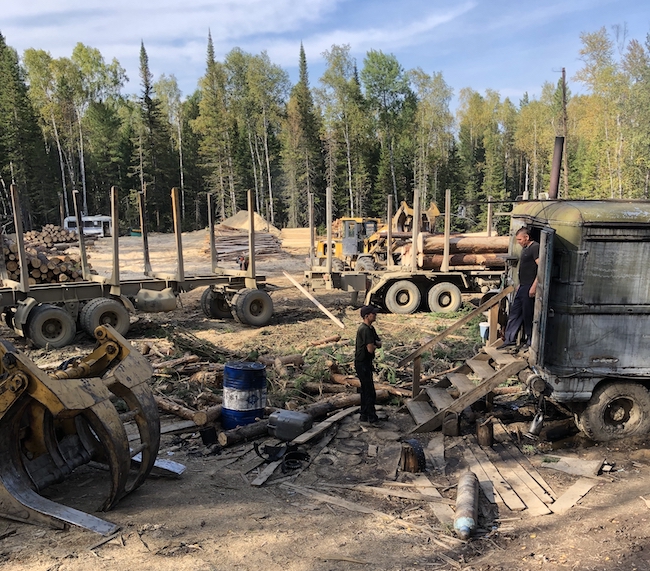A five-hour, back-breaking drive along rugged forest roads west of Irkutsk, Siberia’s capital, past lines of pines, birches and berries, the air turns acidic.
“Smell the difference?” Lyubov Alikina, the 59-year old defender of Siberia’s forests, asks from the front-seat of the truck. “That’s the smell of freshly cut wood.”
The dense curtain of trees, only interrupted by a sandy trail, grows thinner, until eventually it opens on a bare patch of land the size of three football pitches. Camped at the back of the truck, a berry-picker who has been foraging in the area for 10 years, swears.
Loggers have taken all of the cedar, leaving scrawny pines and eviscerated soil in their wake. It is the worst case of illegal cedar felling Alikina has seen. The trees have been taken, in all likelihood she says, to feed enormous demand from Chinese factories.
This is Cheremkhovsky forest. Although it covers a huge sweep of terrain – 7900 sq km – it is but a dot in the sprawling 12 million sq km Russian boreal forest, or taiga, the world’s largest forested region. Nearly a quarter of the planet’s forests are here. The Amazon, by way of comparison, stands at 5.5m sq km.
The threats facing the Amazon – fire, climate change, pasture, mining, logging and criminality encouraged by the Bolsonaro administration – are now global news.
This northern summer, even as the Amazon was ablaze, more than 70,000 sq km of Russian taiga was also torched. The survival of both forests is vital. The Amazon’s thick above ground vegetation stores massive amounts of carbon. But boreal forest soils are hugely important carbon stores.
Just like the Amazon, the stressed taiga faces a multiplicity of threats. Not least illegal logging, driven by demand from the world’s largest wood importer: China.
Logging bans in China’s forests have generated a demand for timber – both legal and illegal – from neighbouring countries. Around two thirds of Russian timber exports are to China, where factories process it into furniture and flooring. The products are either exported around the globe or, increasingly, sold to the country’s soaring middle class.
This is a reminder that CHN is a small independent news site, dedicated to bringing you news from all over the world. That’s expensive and we need our readers to help. Here’s how you can, even for a few dollars a month.
No one can say for sure what the extent of illegal logging in Russia is, but it is likely to be growing, according to WWF and Greenpeace. The Russian forestry agency estimates illegal logging is 0.5-1% of total volume. However, Russian media has since exposed the incoherence of such figures with income from timber products. Independent experts quoted by national publication Gazeta, put it at 15-30% of all felling volume.
The Irkutsk region, where the Cheremkhovsky forest lies, has one of the worst deforestation rates in Russia and one of its largest illegal industries.
Alikina is on a mission is to expose the loggers stealing the forests she sees as her own. In 1983, she and her husband were caught by a radioactive cloud of sulfuric acid emitted during an accident at the Priargunsky uranium enrichment plant in Krasnokamensk, 60km away from the Russian-Chinese border. The cloud robbed her of her husband, who died of cancer in 1997, and left her with a lifetime of asthma.
After months of shuttling in and out of hospital, doctors suggested she live in a coniferous forest by a stream. She bought a dacha, Russia’s traditional holiday home, in the taiga and returned there as often as her meagre state pension would allow her to. One day in 2015, a confrontation with loggers attempting to illegally strip the neighbouring forest sealed her vocation as one of the country’s fiercest environmentalists. She is now accredited by the state to patrol the region and check on foresters’ credentials.
A 30 minute drive from site where the cedar had been cleared, Alikina’s driver, Viktor Marayev, who runs a business selling the forest’s wild herbs and berries, strides across another patch of brown land, his boots kicking up saw dust.
Workers in tractors hoist tree trunks. Others loiter on busted car seats beside a Soviet-era truck. Irkutsk is one of the most impoverished regions in Russia. For many, forestry and berry-picking is their sole opportunity for decent work.
Marayev unveils a triumphant set of teeth.
“Who is the leader here? Who is brave enough to talk to the general?”
Alikina walks towards a caravan, her face set gravely. A man emerges. He is bald, in his 60s and wears a torn shirt.
“We have been informed that you are logging cedar,” Alikina says. The man invites her into the caravan, attempting small talk.
“We are not hiding from anyone, we have been working here for ten years in these forests. Would you like tea?”
Silence.
“Check it all if you want,” he says, gesturing towards a heap of papers. Alikina wades into them, photographing them one by one.
Half an hour passes. The papers are outdated, possibly fake. “Stop the job or I’ll call the police,” Alikina says. The man exits the caravan and orders his men to stop working.
Alikina says later: “You saw how scared they were, you saw their reaction. And it’s the same everywhere, because each of them knows what he’s violating. All the papers he tried to scatter on the table – he gave himself away.”
In the papers, she found no evidence for where the timber would be sent. Although it is common for small firms like this to export to China she says.

